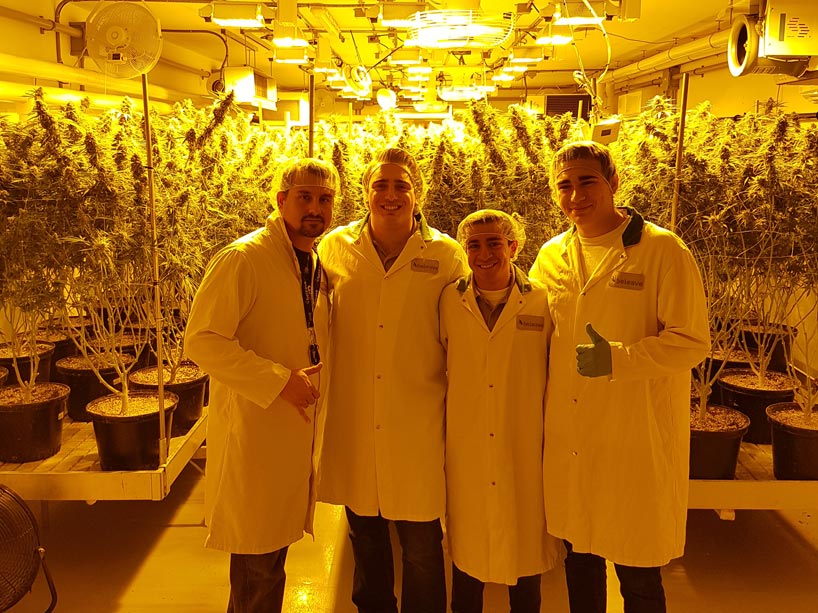Engineering company capitalizes on cannabis market

From left: Shane Whelan-Stubbs gives Blade Filters co-founders Joseph Fida, Giancarlo Sessa and Aedan Fida a tour of his Beleave medical cannabis facility so they could see how their products could be used on an industrial scale.
In what can only be viewed an act of brilliant timing, current master’s student Joseph Fida and his company Blade Filters Inc. have developed a product that fits seamlessly into the cannabis industry: a cost-effective replaceable carbon filter.
Fida, who completed his undergraduate degree in chemical engineering at Ryerson and enjoyed numerous co-op placements, has won all three stages of the Norman Esch Engineering Innovation and Entrepreneurship awards. He laughs when people don’t believe he got into the cannabis business ‘by accident.’ “Actually, I was trying to solve a universal problem: getting my plants to grow through the dark winter months in Canada. I used to love gardening with my grandparents, and when I moved to the city, I tried growing my own tropical plants from seed.”
Fida discovered that his plants needed a lot more sunlight than they were getting during the winter months, so he looked into purchasing a growth locker but was immediately turned off by the outrageous price tag of $3,000.
“As a chemical engineer, I decided to see if I could manufacture one myself. But I changed direction when I stumbled across an issue that many facilities face when using carbon filters to purify their air. The filters needed to be changed regularly, but trying to replace the carbon on your own is messy and inefficient.”
Fida teamed up with his two current business partners, Aedan Fida and Giancarlo Sessa, to determine the voice of the customer. They quickly identified 250 hydroponic stores across Canada, got into conversations with 70 of them, and discovered that 50 per cent of these stores attempted to replace their carbon filters on their own but with little success. A full 88 per cent of them said they would like a solution to this messy and wasteful problem, and 82 per cent said they would pay a premium for a product that works.
“I then approached my step dad, John Allen, who is now the COO of the company, about building a prototype at one of his manufacturing facilities,” explained Fida. “After a few different versions and test runs, we piloted the carbon filters in a few stores in Ontario. We also secured a patent pending with help from Esch Foundation committee member Charles Boulakia.”
In 2017, Fida and his partners incorporated Blade Filters and attempted Stage 3 of Esch. Unfortunately, despite having many of the required components of a successful application, their pitch lost them the award. But in 2018, after refining their pitch with the help of Rafik Loutfy, they won Stage 3. Along with other notable awards from the Ontario Centres of Excellence (OCE) and York University, this win has given them a total of $51,000 of funding outside the personal investments from all three partners.
“I credit a lot of my success and my team’s to the Esch Awards and to the facilities and resources provided through iBoost, (an innovation zone at Ryerson),” says Fida. In January, the company started production on the 3,500 units which are already spoken for, and it’s on schedule to have products in the market by the end of March.
“I want to keep our product Canadian-made,” said Fida. “Our goal is to be a part of making the cannabis industry greener by introducing a recycling and servicing program for the used carbon filters, which will reduce the number of filters that end up in landfills.”
Fida encourages other entrepreneurs to persevere despite naysayers. “Even a lack of money isn’t insurmountable. If you believe in the product and you know your market, you will succeed!”
Supported by the Centre for Engineering Innovation and Entrepreneurship (CEIE), the three-stage Esch Awards offer a financial boost to Ryerson engineering and architectural science students with inventions, innovative technologies and startups. Since 2013, the foundation has given $2 million to support student entrepreneurship at the Faculty of Engineering and Architectural Science (FEAS), furthering the research, development and commercialization of ideas for 245 students and counting.
In 2018, Esch startups raised more than $4.6 million (up 154 per cent from 2017,) generated $2.2 million in revenue and created 61 high tech jobs in 2018.
All 2018 Esch Award winners were honoured at FEAS’s annual Esch Foundation Day of Celebration on January 17. Other winners included WerkApp (external link) , an online platform that connects temporary job seekers with meaningful employment; Emerlet (external link) , a smart-home wireless alert system for people who are hard of hearing or deaf; SWTCH (external link) , which brings electrical vehicle (EV) charging and energy storage to multi-unit dwellings and public spaces; and SmartWSeg, a recycling and waste disposal mechanism designed for restaurants.
Have a new, innovative idea?
The next Esch Awards application deadline is March 1, 2019. Learn more at the CEIE website.